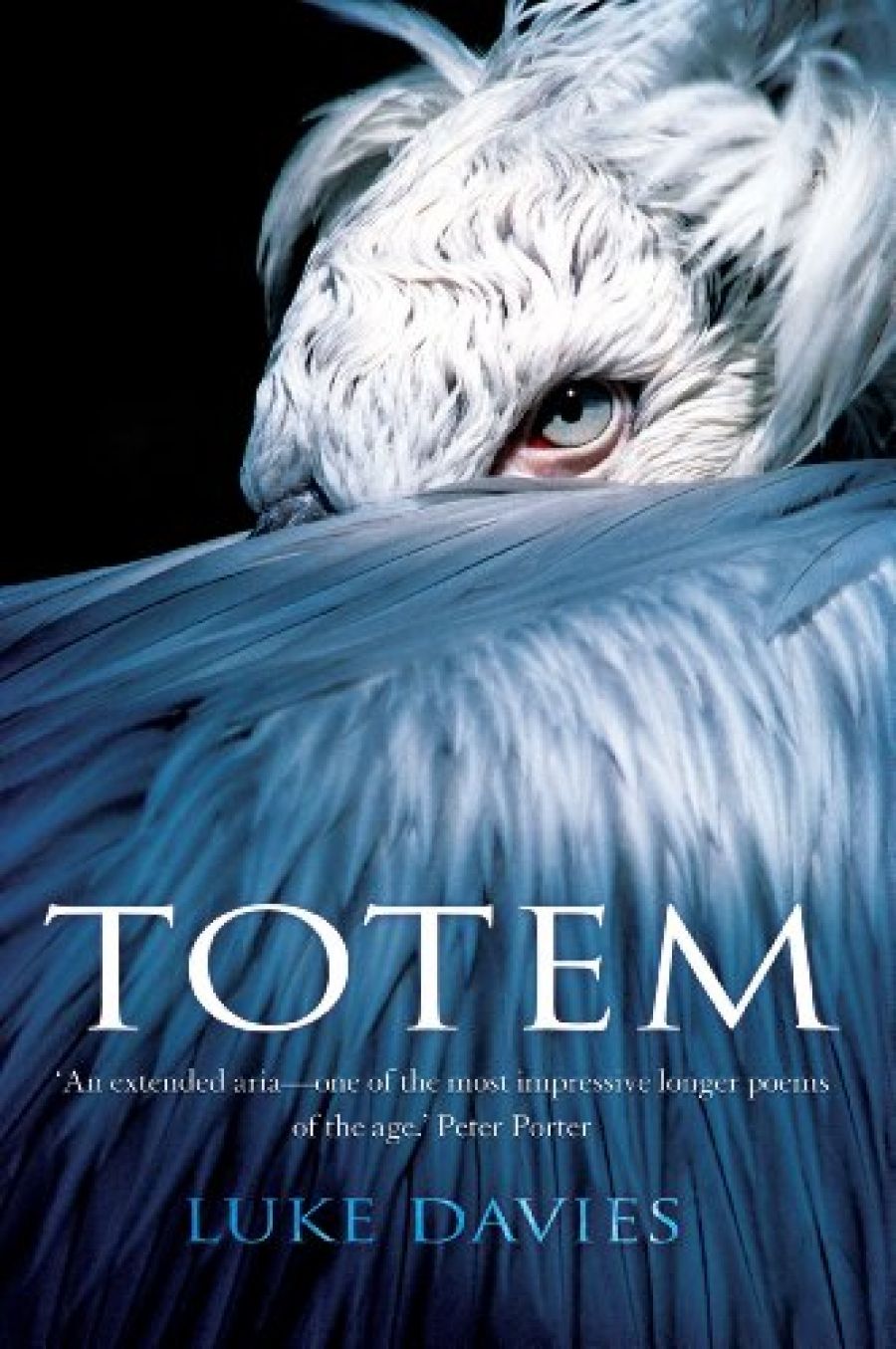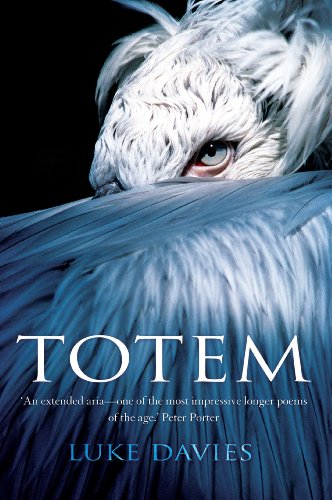
- Free Article: No
- Contents Category: Poetry
- Review Article: Yes
- Article Title: Love’s Stillness
- Online Only: No
- Custom Highlight Text:
Luke Davies is best known as the author of Candy (1997), a novel about love and heroin addiction. His poetry, meanwhile, has attracted attention for its characteristic interest in how we relate to an unknowable universe; it is also unusual in that it draws on a more-than-everyday understanding of theoretical physics. In this latest volume, which comes in two parts – a long meditative poem followed by forty short lyrics, both celebrating love – an awareness of the vast reaches of space remains, although its expression is now less factual and has acquired a new subtlety.
- Book 1 Title: Totem
- Book 1 Subtitle: Totem poem plus 40 love poems
- Book 1 Biblio: Allen & Unwin, $21.95pb, 85 pp
- Book 1 Cover Small (400 x 600):

- Book 1 Cover (800 x 1200):

‘Totem Poem’, the book’s more significant half, is an ambitious and impressive piece of work, conspicuous not only for its length (in Australia, at least, the long poem has latterly given way to the verse novel), but for its affirmatory manner. Basically, in the course of addressing his sweetheart, the speaker promotes love as our one true consolation in the face of material decay – the loss of everything to time. Of course, to love someone is to be grateful for life, and so it comes as small surprise to find that the poem is much occupied with matters of fortune and opportunity:
There’d been a planet swirled with dust. We called it luck
to be alive in the epoch of the foliage. To have not only
poetry, grand luck enough, but the long wheat swaying
and the peonies its subject.Tellingly, Davies is also aware that to live well – to live at all – we must honour life:
To be alive I had to praise, to praise I had
to learn to speak. Speak loudly though to drown
the blood about to burst, to drown eternity
whose howl floods every canyon into nothingness.
In passages such as these, there is a tacit acknowledgement of former hardship; after all, a feature of ‘Totem Poem’ is the way it celebrates love’s transformative power. Elsewhere, Davies can be more explicit, as in the early reference to a time marked by ‘Carpathian’ sorrow and the relieved admission that ‘[s]omething has lifted the lid off the labyrinth’, one of several recurring lines and phrases. Indeed, the following lines, scarcely less exuberant than those with which the poem climaxes (where Davies writes of wedding bells and ‘a shining isomorphousness’), give some indication of what has gone before:
… I dreamed myself clear.
[…] and everywhere I looked: expansitude. The streets
becoming boulevards, my head held high I steered
a cracking pace and sparks came off my shoes.
Another major aspect of the work, and a characteristic of Davies’ previous collection, Running with Light (1999), is the attention it gives to animal and bird-life – sometimes, these images are almost paradisical. Throughout, there is a Buddhist sense of a connection existing between every creature that has ever lived: ‘all things stood for every other thing,’ Davies writes.
Particularly important in this context is the figure of an omniscient falcon which ‘peel[s] back the layers of time’, but cannot penetrate to the greater depths. While, at first, the falcon weeps at its failure to possess everything, acceptance soon follows: ‘The world was old. / We cannot live forever but we live … ‘
Clearly, as a vessel of ideas, ‘Totem Poem’ has plenty to offer: it is allusive, sensual and hypnotic, and we are moved by the protagonist’s magnificent triumph over the pain of singularity. Furthermore, it contains some memorable lines (‘I secretly admire your underwear, your long / elusive legs’ and ‘Things came and went – the years and all the airports’). Unfortunately, a good deal of the writing is not essential: one often feels that Davies might have just as well put things another way. Even the repetition of certain phrases (a few of which are carried over from the earlier books) can seem arbitrary, so that there are occasions when he comes perilously close to producing, not poetry, but incantation.
Possibly, given the inclusion of the lyric poems, Davies anticipated such criticism. Thematically, this half of the book has much in common with the first; only, here, the treatment is naturally more straightforward and, on the whole, rather conventional. There is the traditional identification of the love object with nature, for example:
Sugar Lee you are the sun today,
Pervasive light and heat, and I
The valley floor, the birch pine slopes,
The snow-capped mountain peaks, transparent sky …
More interesting are the poet’s descriptions of love’s ‘stillness’ – the idea of ‘finding’ oneself in another – as compared to the dislocation of travel and ‘loveless circumnavigation’.
Taken together, the poems read harmoniously; but, again, Davies’ use of language is not especially remarkable. His diction can seem quaint (‘The world will organise itself the while / I whisper praises in your ear’), and one or two of the rhymes sound unintentionally comic, as in the following, with its nod to Sappho: ‘I am far from home. / The mountains measure / The years like a metronome.’ In spite of these complaints, it would be churlish not to commend Davies as a writer to watch.


Comments powered by CComment